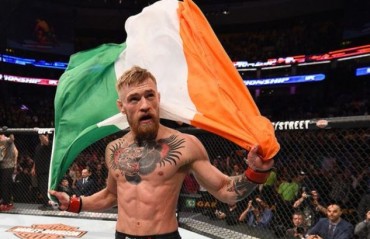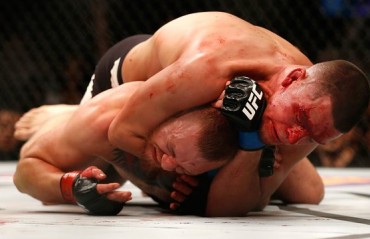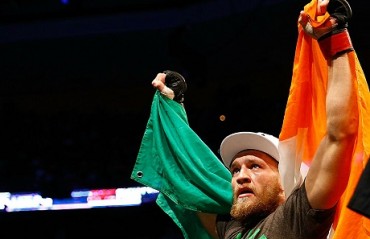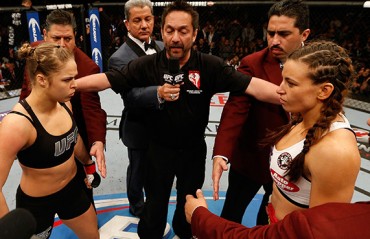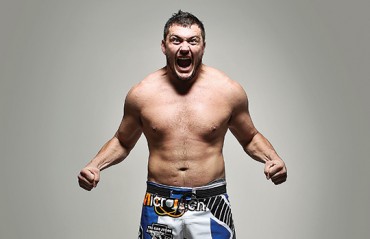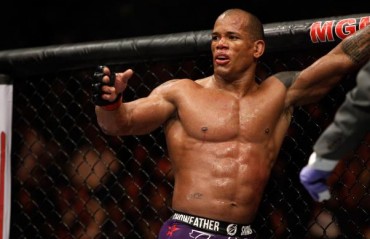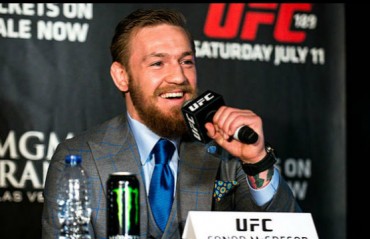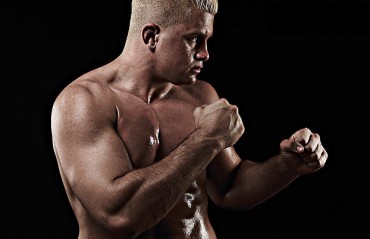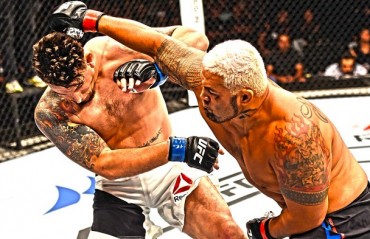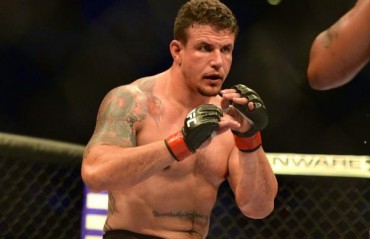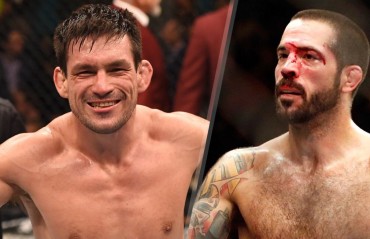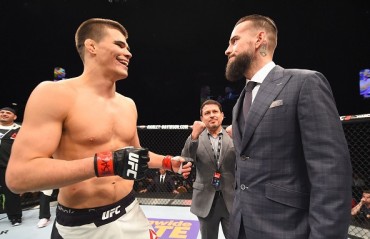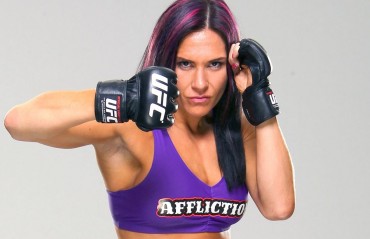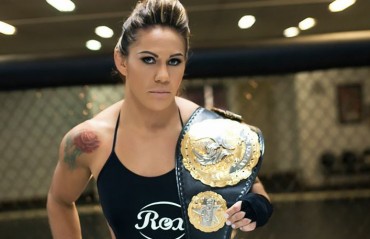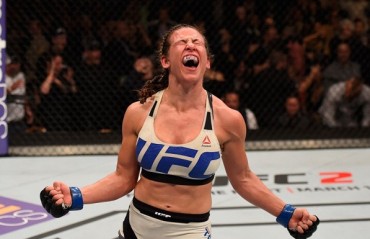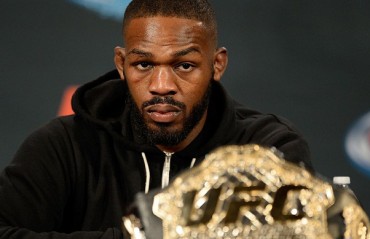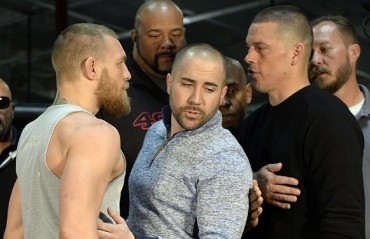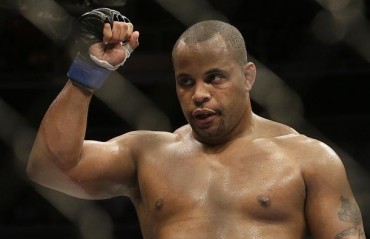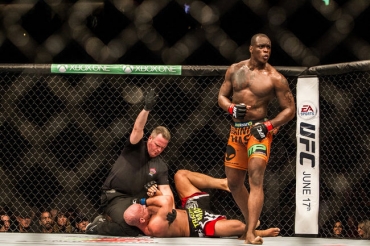Road to UFC - Crossing the River: How MMA Found Anshul Jubli
- By Chiranjit Ojha

- January 10, 2023
IT'S A split decision.
After three brutal rounds of trading blows in the cage with Kyung Pyo Kim, Anshul Jubli waits with silent anticipation as the announcer reads out the judges' scorecards. One has it for him, the other has picked Kim as the winner.
For the first time in Anshul's Mixed Martial Arts career that spanned more than twenty bouts in amateur and professional circuits across seven years, he faces the prospect of a defeat.
The announcer's dramatic pause fills the still air. Anshul looks to the skies.
The Etihad Arena in Abu Dhabi, which was packed to the brim just a day before when it hosted UFC 280 where Islam Makhachev, hailing from the mountains of Dagestan, Russia, won the Lightweight title with an unbelievable submission of Charles Oliveira, now looks empty and dark like a void, except for the blaze of the lighting grid glaring down on the Octagon. Anshul, who hails from the mountains of Uttarakhand and harbours the same dream as Makhachev, now has his hopes hanging in a balance.
The scorecard of the third judge, a de facto tie-breaker, is going to decide who progresses to the final of the 'Road to UFC' Lightweight tournament, and get a shot at fighting in the biggest MMA organisation in the world. And with a close fight like this one, there's no telling which way the decision would go.
As the announcer begins to read the third score, Anshul closes his eyes.
***
The small town of Uttarkashi falls bang in the middle of the Gangotri-Kedarnath tourist route. Being a district headquarter and a major transit town for travellers and religious devotees, it's more populous and better developed than the typical Himalyan hamlets that are dotted across the valley.
The turbulent current of Bhagirathi, the spiritual headstream of the Ganges, splits the town in two. It's the river that Anshul Jubli crossed every day as he trotted back and forth between home and school.
Even after years of living in cities, this mountain town with its slopey roads and land plots carved into the hillside like a giant's staircase, remains integral part of Anshul's life and personality.
When asked how he got into the sport of MMA, this is where he begins his story,
"To be honest about it, it was street-fighting. I got into a lot of fights in school... I used to love fighting, showing off some 'dada-giri' when I was a school kid. Till 10th or 11th standard it was like this. So when I would have to fight an older kid who's bigger and stronger than me, I would try to learn techniques. I would watch Youtube videos or movies about fighting and try to copy how they threw punches and stuff. So I always felt that pull."
Growing up, Anshul had more energy than he knew how to contain. He played all the sports at school, and football in the evening. When it came to studies, he was clever and restless. He liked mathematics, and physics to some extent. He was quick to understand scientific concepts and loved the puzzle-solving aspect of maths. But what he didn't have was a year-long patience cycle,
"Every year I'd top the class in the early tests. But by the time the final exams came around, I'd have lost all interest and my performance would have gone lower."
By the time he was done with in college, even football had lost his interest. It was clear that he needed a sport that would channel his energy and capture his imagination, his love for problem-solving, much better. And that's where MMA came into the picture,
"I felt I needed to join a sport... when I heard about MMA, a sport with boxing, grappling and wrestling and everything combined, I was immediately attracted. I knew I had to try it. It was more like, I didn't find MMA, MMA found me."
Anshul recalls the first time he walked into an "MMA gym", more than seven years ago. It was in Dehradun, at the AJ Fitness & MMA Academy. It was mostly a fitness gym. The owner knew some boxing and MMA; and majority of the training was cardio-based with occasional sparring thrown in. There was no wrestling or jiu jiutsu.
Not knowing what to expect, Anshul had shown up for his first class in jeans and t-shirt. But his very first lesson was enough to make him realise two things. One; he was naturally good at this. And second, this was his life's calling.
And just like that, Anshul Jubli had crossed his first major river on his journey to become a professional MMA fighter.
***
Soon after joining his first gym, Anshul had his first amateur fights. He had no training in grappling, and was just starting out with his striking. But so were his opponents. So it didn't take much for him to win,
"Nowadays when you see amateur competitions in India it looks so good. The kids know how to do everything, striking, grappling. But back then it was like two street guys fighting in a cage... when I started watching UFC fights, I realised what MMA actually looks like... I don't feel any pride over my amateur record. It was pure luck. I used to fight in a higher weight class, in Light Heavyweight and Middleweight. I was a fat kid fighting lower level opponents."
While still studying in Dehradun, he had six amateur bouts and won all of them. He had travelled all around the country, including Mumbai, Shillong, Delhi and Bengaluru. This had familiarised him with the Indian MMA circuit, and in 2018, he decided to look for a proper fight gym to join. And that's how he eventually ended up at Crosstrain Fight Club.
This, to Anshul, is the next big river that he crossed in his MMA journey,
"I am where I am because of Crosstrain."
Regarded as one of the best MMA and BJJ institutions in India, Crosstrain is the brainchild of Siddhath Singh, the most accomplished Brazilian Jiu Jiutsu competitor in India. On Anshul's first day here, he had a BJJ class and immediately knew this was the training he needed to get better. A few days later, he met Siddharth Singh for the first time, and made up his mind to stick with this gym in the long term.
Anshul, the rural kid who was still finding his feet in the big city, was too shy to even approach his coach at first. He recalls,
"When you've come from a small town to a place like Delhi and you see somebody like Siddharth sir who is a personality on his own, and a big name in the MMA community, everyone knew him, so I used to feel very intimidated... on top of that no one spoke Hindi in the academy, I used to think I'd say something and they'd answer in English, what would I do then? It happens with small town kids, you know. You have some insecurities like this at first.. eventually when he noticed how consistent I was, he came and told me that I was a sponsored fighter of Crosstrain now. I think that was the first time we actually spoke. Before that we only talked during sparring, when he used to give me advices and I used to say, ok."
To Anshul, the grappling arts came just as naturally as the striking disciplines. Within two weeks of joining Crosstrain, he entered his first BJJ tournament at a college in Gurgaon. He won the white belt competition. In amateur MMA, he already had a decent record; and the coaching he received at Crosstrain accelterated his career.
Siddharth Singh, in an interview with TFG, had earlier spoken highly of his star pupil, and elaborated on what caused him to make Anshul a sponsored fighter within just 4-5 months of joining the gym; the fastest fighter sponsorship in Crosstrain's history,
"He's special. He has dedicated his life to this. He does nothing else. He's in the gym twice a day. He's putting in 5-6 hours every day. He's living and breathing it, studying fights all day."
Anshul, too, is full of praise for his coach,
"Everyone thinks Siddharth sir is a big mascular guy who doesn't talk much. But he's a lot of fun. I have really enjoyed going to these last 5-6 fights with him. I have shared a lot of emotions with him. He is very driven, very competitive, super focused but he knows life isn't just about hard work and discipline. He has taught me that if you want a long career you must have breaks, you must have fun moments."
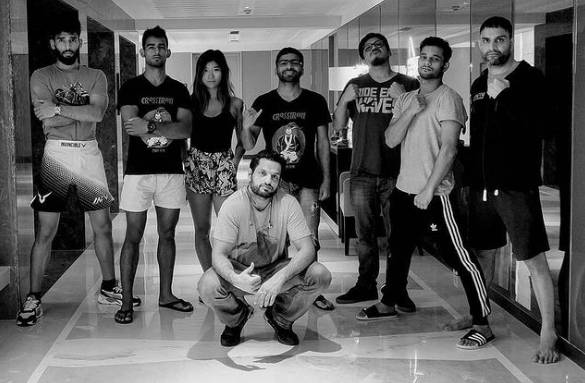
Anshul was growing. Both in terms of age, skills and stature. By now, he was a well-known figure in Indian amateur MMA,
"There are stars in the amateur circuit that maybe you don't know about but the fighters know all of them as the ones to beat. I had a winning streak going so I was getting to that level of popularity, as an undefeated guy who had beat some big names... I wanted to get stronger in that level."
With a glittering 13-0 record, he was looking set to become one of the most sought-after amateur fighters in the country. And that's when, his fate took another quick turn.
It was time to cross the next big river.
***
Unlike many of your favourite MMA fighters, Anshul Jubli doesn't have a tattoo yet. But if that were to change, he knows what it will be,
"If I get a tattoo it would be the date of my first professional fight. June 29th, 2019. That day means a lot to me."
Back then, a new MMA promotion had just started its journey: Matrix Fight Night. They had held their successful first event, laden with big names that had won over the fans in the erstwhile Super Fight League. For their second event, they were considering having some amateur fights early in the card.
For Anshul, this was a perfect opportunity,
"I tried a lot to get a fight there. I approached Alan Fernandes and the whole MFN team. I used to put my name up in Instagram comments. I had made a whatsapp group with my friends where I told them to tag Alan Fernandes, Ayesha Shrauff and others to have amateur fights and all. I didn't even think that someone would offer me a pro fight, because MFN 1 had no new fighters, only the old SFL fighters. But when their main event, Bhabajeet Chaudhary vs Saneep Dahiya, got cancelled, so they looked for an opponent for Sanjeet Budhwar who was a star. But all the pro fighters turned it down. Budhwar was 4-0 at that time, he had beaten Chaudhary very badly. He had an image of invincibility, no one wanted to face him. But because I was messaging everyone for a fight a lot, saying I would take on anyone, MFN thought this guy is eager, this 'bakra' (sacrificial lamb) fits the bill. Let's 'halal' him. They asked me and I was super excited."
When you're looking for an amateur fight and instead you're offered a professional debut against a 4-0 rising star on a relatively short notice, that's not furthering your career but risking it. But being cautious wasn't something Anshul was interested in,
"If there's one thing I can't change about myself, it's my over-confidence. I tried a lot, but it doesn't work. The moment they asked me I said yes. Then Alan Fernandes asked, does your coach agree? I was like, oh yeah, I have to ask him too. So I called Siddharth Sir. He said, give me some time. He called back about 15 minutes later and said, let's do it. I think he was watching Budhwar's fights to see if he was beatable. He had a lot of confidence in me... I was very ready and sharp. I wasn't sound technically or skill-wise, but I was well prepared. I was competing regularly and winning, so my confidence had built up. Competing a lot after coming to Delhi was great for me."
Going into the fight, almost no one outside Anshul's own team thought he had a chance. On paper, it looked like a showcase matchup for Budhwar; and a rude awakening for the high-flying amateur that there's levels to this sport. And Anshul felt this prevailing attutude every step of the way,
"It was the worst build up ever. Before this I had only done amateur fights. I had never stayed in five star hotels, never done photoshoots or interviews. I was nervous about everything. On top of that whoever met me said, why did you take this fight? All right compete well but next time choose your fights well. I was basically just staying in my room and going out to eat late at night so I didn't have to face anyone. Everyone was looking at me like what will happen to this poor kid? It's not like I doubted myself, I was sure I'd prove them wrong at the fight. But at that time, how do you answer them? I used to be nonchalant and say let's talk after the fight, but it was wearing on me after a while."
To make matters worse, he was having the worst weight cut of his life. He had never cut down to Lightweight (115 lb or 70.3 kg) before. He didn't have any experience on how to manage it carefully; during the cut and after it.
On the day before the fight, he made weight. And afterwards, to celebrate the end of weeks of food and drink deprivation, he ended up eating a lot of red meat and yogurt. The sudden extreme shift in food intake shocked his famished digestive system. And on the night before the fight, he was throwing up violently. Anshul recalls,
"I didn't know anything. I wasn't professional, I didn't know how these things are dealt with. I was thinking, Coach would get angry with me. It didn't occur to me that he could help me feel better and re-hydrate. It was a big mistake. I didn't regain my weight at all. Whereas Budhwar gained at least 5-6 kilos, he looked much bigger than me on fight night... and I felt dehydrated even walking into the fight... if you watch that fight and my last fight, you will notice the difference in my physique, my movement, my footwork. I was in alien conditions. Recently I was in a fight where people were holding the cage so it didn't break during a fight. And now I was under those big lights, in front of Tiger Shroff and Disha Patani. I didn't even move that well."
However, despite all odds, Anshul held his own and stuck to a grappling-heavy strategy that suppressed Budhwar's gameplan. And when the three rounds were over, there was no doubt who deserved to get his hand raised.
Just four years after his first amateur fight with zero grappling knowledge, Anshul had crossed the river into professional MMA as a complete fighter. Indian MMA now had a new star.
This bout was Anshul's introduction to the sensory overload, both inside oneself and outside, that athletes are put through in professional prizefighting. And what surprised him the most was not the challenge he faced inside the cage, but how his own mind processed the whole experience,
"When you're counting days down to the fight, meditating, thinking about how you'll fight... no matter how much you steel your mind at one point you think about losing. And that's at the backstage. Just before you're about to walk out. No matter how sure you are of you winning, no matter how much worse your opponent is, I'm sure backstage at some point it will cross my mind that he might beat me... that nervousness, that fear, you feel it before you go on. Once you're in there, you warm up and you think, where did that fear go? There's no nervousness any more. When you're in the fight your mind works differently, you see blows and submission attempts coming your way differently. That ride, that's what I enjoy more. After the fight, I get bothered thinking, why don't I feel good any more?"
But despite the newness of it all, there was one underlying takeaway that he cherished more than any other,
"I wasn't supposed to win that fight. Just had a month to prepare for those big changes. But I did. And that assured me that I have it in me, I can seriously represent India in the international stage in UFC."
***
The life of a professional fighter is radically different from the athletes Indian sports fans are used to watching, following and celebrating.
Whereas a cricketer, footballer or wrestler will play hundreds of matches throughout their career, a high level professional fighter - whether it's boxing or MMA - will compete just twice or thrice a year. And each time they will assume the risk of serious, career-altering injuries like none other.
While most athletes get the quick gratification of competing multiple times a week and the security of a long season, fighters toil away for months in each training camp and have but one night to make the most of it; and if they don't, it's a massive setback to their career.
So it goes without saying that the highs and lows they deal with in their mind can wear heavy on anyone. And Anshul is quick to admit it's a process he hasn't yet perfected,
"Ever since I have started my professional career I have never felt satisfied after winning a fight. That happiness has never been there. I felt the adrenaline, like I've done it and proved myself. But never that satisfaction. So nowadays I know I'll feel good for an hour or two after winning a fight, then it'll all come down. Then I'll have to go to my friends, my family. Even though I go through so much, face injuries, put everything into it, I don't feel satisfied from the fights. For that I have to go back to my hometown and see my family, my childhood friends who don't care if I have won or lost, who talk to me the same way without caring that I have become famous or something. That's where I find my peace.... I may talk to someone about this... when you're going through a long training camp, doing hard sparring, doing weight cuts, you hope that because I'm putting in so much effort, my glory will be that much bigger. But when after a fight you don't feel that much satisfaction, that does bother you a bit. I'm being serious, I enjoy the ride more than the win. And not by choice, it's just that way."
Other than the competitive aspect of the fights, Anshul also had to deal with the glamour aspects of prizefighting. He came up with ways to not let the bright lights and fame get to his head,
"You live in Versache or Taj Hotel. You have a manager with you all the time. Even if you want water he runs out and grabs it for you. Everyone makes you feel like a star... I don't fully comprehend it... my sister is in a corporate job and she's doing very well, growing a lot, but since she's not in front of cameras she gets less recognition for her work. I feel like this job, just because it's in front of cameras, that's why it gets you so much applause. That's why after I come back from a fight I wash my dishes, clean my house and do all the chores to make myself realise that this is the reality, that was just a six-seven day phase... because first couple of fights in the MFN I had a hard time adjusting afterwards... a person is a person. No matter how much you say, don't let success get to your head, it does. Humans are designed that way. If you don't learn to handle your success it messes with you."
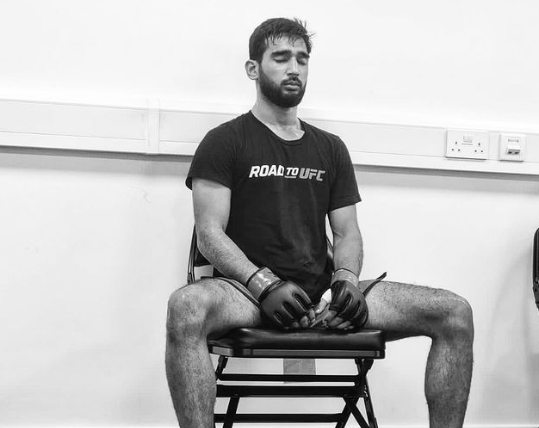
Anshul kept competing. Months later he was back at MFN 3, where he got a unanimous decision win over Amit Raj Kumar. Then, in February 2020, he got his first finish of his professional career, stopping Rajith Chandran by TKO in the first round.
The people who doubted him before his debut no longer saw him as a high-flying amateur who had just begun to dabble in professional MMA. He was now in the conversation of being among the best Lightweights in this part of the world.
He had come a long way from his Himalayan hometown. But he felt it was important to keep reminding himself of who he was, where he came from, and what he had to do to get here,
"I come from a very small town, from up in the hills. I saw comedy sketches about kids walking kilometers to school, and I literally did that. I literally crossed a river to get to school. It's no joke to me... a small town boy gets a little bit of money and fame, he can get ruined if he doesn't learn how to deal with it in a grounded way."
Anshul was now 4-0, and looking for bigger challenges. Little did he know that he would get his wish soon; but it wouldn't be a higher level opponent in the cage. Instead, it would be a virus that would turn every home in the city into a cage.
***
The COVID-19 lockdowns were as contrary to Anshul's way of living as possible.
Suddenly, the restless free-spirit was disconnected from everything that he had come to call his lifestyle. His next fight was cancelled, as it wasn't possible for MFN to hold events during the first wave. Training, sparring, gym, it was all off-limits. Somebody who found it hard to sit at home when he had an injury was now subjected to an indefinite internment.
The pandemic's restrictions forced Anshul to turn inwards for his daily fix of knowledge and thrills. And it brought him benefits he had not anticipated,
"Usually I always trained. All the time. In the morning and evening. Shadow boxing. Running in the afternoon. I exhausted my body and mind. But during the pandemic I didn't have a goal in front of me. So there were days I didn't train at all, I just stayed at home. I had a lot of time in my hand. So I used that time to get acquianted with sports psychology. I researched a lot about the lifestyle and mindset of top athletes... I heard a lot of podcasts featuring top neuroscientists who work in the field of sports. I learned a lot then, about what works and what doesn't work. About how to bring recovery into the schedule. Before this I didn't do any meditation, I wasn't interested. But during this time, I understood that the science behind it, and experienced a lot of good results... after the lockdown, I'm much more productive with my training. I plan my sessions better. There's more creativity to what I do. If not for the lockdown I'd have kept training the old way and maybe got injuries and burnout."
Over time, he was gaining a better, more mature perspective about himself as an athlete, and how he's supposed to approach the sport,
"I believe an athlete should be a problem solver. Figuring out what's going wrong with the body, the plan, the technique, whether by oneself or by asking others, it's necessary. You can't think like injuries are natural so they should just be accepted. Like, they are natural, but you shouldn't do nothing about it. You should ask the strength and conditioning coach about how to design your training to lessen the chances of getting them."
Perhaps it was because of the long isolation that when Crosstrain opened back up with strict COVID protocols in place, Anshul took his responsibility to those who shared the gym with a lot more seriously,
"I truly believe that if you are a good athlete, or want to be one, you must try to teach it to others. Maybe you can't do regular classes, in that case go to a new guy who's just starting out and tell him you'll show him the ropes. It will be helpful to him, and when you start explaining things to him you'll understand the game better. And even at other times, like when you are at home, something occurs to you about the game, you should write it down in a diary. Maybe you'll never read it again but just the act of writing it down cements it in your subconscious."
His renewed and rejuvenated approach to the sport was put to the test when he returned to the cage; now as a high profile fighter under the MFN banner. He was the co-main event at MFN 5, where he defeated Srikant Sekhar who was on a three fight winning streak; same as him. And then he took on Mohammad Mahmoudian, his first international opponent, as the main event at MFN 6. He got the job done in the very first round, via submission.
Anshul had settled into the life of a professional Mixed Martial Artist, and developed his own style of fighting,
"I don't put that much emphasis on what to do against a particular opponent in a fight. I'm in the phase of my career where I must focus on myself. If I'm well prepared, then I don't need to worry too much about who the opponent is. But still, you have to study your opponent a bit, about their weaknesses and strong points."
Also, the way he was looking at the wider world of MMA, including the UFC, was now a lot more academic in nature rather than just enjoying it as a sport,
"Whoever is doing well now... whoever's weakness has not been exposed yet is my favourite... I loved Khabib. Volkanovski too, because destroying Max Holloway like that was extraordinary... usually I'm not able to pick favourite fighters because I am quite selfish in that regard. If I can't find weakness in somebody, I like him... I haven't studied Dimitrius Johnson that much... what do I get from studying Flyweights? Neither can I copy that speed, nor the techniques or the scramble... I like Featherweights because that's the speed a Lightweight should have, along with the strength of a Welterweight... I watch Khamzat Chimaev a lot these days, you have no option but to watch him. He is a global superstar now."
And unbeknownst to him, he was already being scouted for an opportunity to become one of the very UFC fighters he was watching from afar.
***
When Somesh Kamra, UFC's main talent scout in India, approached Anshul Jubli's coach Siddharth Singh to recruit him for 'Road to UFC', he didn't reveal the whole story to them. He told them that it would be an MMA event in Singapore, and the organisers of the UFC, i.e. Zuffa Inc, were involved in it.
It wasn't until later than Anshul found out what exactly he was getting into. But when he did, he was giddy with excitement,
"I felt like I was on the right path. I was going through a bad phase before that, with injuries and everything. I wasn't able to train properly for five to six months. That's rather bad for an athlete like me who always craves competition. Without a clear goal in front of me it's hard for me to get out of bed. So when I found out, I was really happy. I had a clear path in front of me; win Road to UFC, get into UFC, then get into UFC top rankings, then win UFC belt, make history... I don't like to think that far ahead but I can't help it."
Anshul was about to cross the biggest river of his career yet; from being the star in a domestic MMA promotion to being a newbie contender at the international stage.
Just like his pro MMA debut, this too was a sudden move. He had just about a month to get prepared to take on Patrick Sho Usami. The weight cut was rushed by necessity. And when he reached Singapore for the event in early June, experienced a professional environment unlike anything he had come across so far,
"I'm not like some big shot champion in UFC so I don't get any special treatment as such. But in MFN I used to get that. Since I was a main event, I used to get interviewed a lot. The moment I showed up there were people around me. But not the case in UFC... although I got a lot of attention in the media. What I felt was that the UFC machinery is something that doesn't make a single mistake. It's become an established system that practically prints out great fights. In UFC, you don't have a single moment of doubt in your mind. Because they know what goes on in the minds of fighters and coaches. They make everything clear on the very first day. You don't have one guy attending you. Instead there's a separate department for everything and you get somebody from each department coming up and explaining how it works. Whatever you may need, it's already in your room. They think of everything."
Anshul left no stone unturned in his preparation and duly made weight the day before the fight. But unfortunately, his opponent didn't. The fight fell through at the last minute and there was no way to find a replacement at such a short notice.
Although this meant he was getting a bye to the semi-finals of the tournament without even having to fight, Anshul wasn't happy about it at all,
"I was telling myself that it's for the best but I was sad about it nonetheless. I wanted that fight to happen, to win it. I wanted that recognition that Anshul Jubli can represent India abroad."
Anshul and his coach hung around to see the event. Pawan Singh Maan, the only other Indian fighter in the tournament, got knocked out by Jeka Saragih in the third round, leaving Anshul as the only remaining representative for his country in the competition.
He was in the middle of MMA's biggest spectacle; surrounded by legends of the sport like Daniel Cormier and Robert Whittaker. But Anshul wasn't enjoying much of it.
Experiencing world class MMA from up close had made him realise what was at stake in the journey ahead,
"I like fighters who win. When they lose I don't like them so much. I know it can happen with me too. When I'm winning it's great but if I lose my phone may stop ringing... people want success stories. But how many get success? Books are only written on those who succeed. Those who fail, who wants to hear their stories? I know I don't. Somebody tried everything, worked hard but failed; I don't want to hear that. Why should I? Life is tough as it is, why would I demotivate myself with stuff like that?... I don't want to become a tragic figure."
He came back from Singapore without another win to his name, but a lot wiser as an athlete.
He knew what was ahead of him; a Road to UFC semi-final fight against the fearsome Kim Kyung Pyo whom he had just seen knock out his opponent in the first round. There was little doubt that this would be his biggest challenge yet.
But this time, it was not a hasty match-up. This time, he had time, and the chance to prepare to fight at a higher level.
He came back, took 10 days off, then it was time to go.
***
No one from India has won a fight in the UFC.
This is one of the biggest unrealised dreams for those who follow Indian MMA. A win at the biggest MMA organisation in the world is the ultimate sign of progress and belonging in the sport. But Bharat Kandare's only fight in UFC ended in a quick loss and although Arjan Singh Bhullar, the current ONE Heavyweight Champion, proudly carried the Indian flag when he won three fights in the UFC, he is born and brought up in Canada.
So, no citizen of India has ever had their hand raised; neither in the UFC nor any of its numerous developmental competitions like The Ultimate Fighter, Dana White's Contender Series or Road to UFC.
And the responsibility to help Indian MMA cross this particularly treacherous river had fallen upon one Anshul Jubli.
It was a daunting task. But this time, he had the means to get the preparations right.
After his initial 10 day rest, he started his off-camp training. He avoided hard sessions to ensure there was no burnout. Just drills and new techniques. Then, in July, he started with the strength and conditioning training.
Around mid-August, he flew to Bali to have an eight week training camp where he would get to train under higher level striking coaches than before, with some world class training partners close at hand.
His weight cut, too, was well-planned this time; a well-measured reduction of 9 kilograms over seven weeks. And he knew how to regain 4-5 kilograms after making weight without throwing his digestive system for a loop again.
He studied Kyung Pyo Kim, looking for holes in his game,
"He was my first opponent who was a complete fighter. Most of those I faced before were good in one disipline... but he was not particularly weak in any department whether it's striking or jiu jiutsu or wrestling... I had found his weaknesses though. I paid attention to the fights he lost rather than he won."
Kim was coming in with a record of 11-3; with six knockouts and two submissions. He had fought across Asia and had way more fighting experience than Anshul. He was regarded as one of the tournament favourites.
But to Anshul, despite his lack of experience, he was going in with an advantage his opponent did not possess,
"My weaknesses have not been exposed yet because I have never lost. And none of my fights have shown my full potential. If you ask my coaches and training partners, they will tell you, I have never showed my A game in the cage. What I have executed is my coach's plan. I don't train that way, I don't spar that way. It's always been my coach's plan to win safely. He says, more than how you win, it matters whether you win or not, at least in this stage. When you are 5-0 or 6-0 that stays in people's minds more than how you won the last fight. So my natural game has not been displayed at all. I don't even post sparring footage, cameras are banned in our academy. No one can anticipate how I'll fight."
With that, he made it to fight night at the Etihad Arena. He had suffered a broken toe during training, but he managed to keep that a secret from everyone. He made the weight, managed his health, suppressed the doubts that rushed to his head backstage before walking out, and then approached the fabled Octagon to the tune of Piyush Mishra's 'Aarambh Hai Prachand', the blood-pumping war song of his choice.
And war was what he got. Kim came out swinging from the get go, looking for a quick finish. He landed a heavy left hand on Anshul.
But Anshul did not flinch or retreat. He stood his ground in the pocket, well within Kim's reach, and began to trade blows back and forth. Soon, Anshul was breaking through Kim's shield, landing punches and knees. And suddenly, it was Kim who was backing away.
Anshul stayed right on his prey, chasing him to the edges of the cage. The experienced Kim was well aware of positioning; he kept dodging away to avoid being caught in a corner.
Kim changed his strategy. He was now looking for takedowns. But Anshul stuffed his attempts. So Kim used a single leg attempt as a decoy to get Anshul with an upper cut. But by the time he got to firing position, Anshul had swiftly moved away; and firing back. Anshul's right hand clipped Kim, who got knocked down.
Anshul's game plan was working.
We've got a banger on our hands between Anshul Jubli & KyeongPyo Kim
— UFC (@ufc) October 23, 2022
[ #RoadToUFC is LIVE on @UFCFightPass ] pic.twitter.com/jLExCxeGuq
Kim got a takedown but Anshul defended himself well on the canvas and was back on his feet soon.
Now Anshul had demonstrated that he could get the better of his opponent both in a stand-up battle and on the ground. Kim needed to do something drastic to get back in the game. So, he upped the pressure in the second round.
He took Anshul down but it didn't do much. He drew Anshul into a striking battle and almost got his mouthpiece knocked off. Enraged, the veteran started throwing haymakers and finally, landed a power shot on Anshul that wobbled his balance. Anshul survived. But Kim was definitely back in the fight.
After two rounds, Ahshul was exhausted and breathing hard. He was being tested harder than ever before. But there was still a whole round ahead of him; one that would determine the fate of this fight.
He steeled himself, put on his mouthpiece and got back out there.
Kim knew the best way for him to seal the deal was to take Anshul down and hit him with some ground-and-pound. So that's what he went for. He got the takedown again but Anshul proved to be impossible for him to contain on the canvas. Soon, the action was back on the feet, and Anshul was marching forward like a man possessed, exchanging blows till the very end.
When the fight ended, there was a nervousness in the air. The statistics that flashed on the screen showed that Kim had landed more strikes than Anshul, and he had got some takedowns too. But it was Anshul who had done more damage. A close bout like this could go either way in the judges' scorecards. And it did.
It was a split decision.
***
"And the winner, by split decision..."
Anshul covers his face, trying hard to stay calm in a moment of utmost nerve-wrecking tension.
"...Anshul Jubli!"
He feels the referee hoist his left hand up in the air. Anshul opens his eyes as a roar of cheers rose up around the dark cage. He has done it. He has become the first Indian citizen to win a fight in a UFC-related competition. He gives the camera a quick celebratory dance.
Anshul Jubli is going to the #RoadToUFC finals! pic.twitter.com/XmyCtVItwY
— UFC (@ufc) October 23, 2022
He has, despite everything, crossed the most difficult river in his career so far. And this time, he has brought all of Indian MMA along with him.
The pent up emotions pour out in his post fight interview. And in that moment of speaking his heart, he doesn't just talk about himself. He speaks for all Indian fighters. The 'I' and 'we' bleed into each other as he says,
"Namaste UFC! India is here! India, is, here!... I was underdog, big underdog. But you know, just five-six years and there will be so many Indian fighters in the UFC. And we're gonna rule the world. We're better than everybody... I'm from India, I train in India. There's almost zero black belts in India. No Muay Thai coach, no Kickboxing coach. Just boxing and wrestling... but see... it's the land of warriors. In our history, there's so many warriors. And I'm gonna prove it. People think Indians are only engineers or doctors... but I have a world champion mentality. Obviously my skills are not there yet, I just started four years ago. Give me four more years and I'll be a world champion."
Looking back, Anshul doesn't feel like he has spoken too soon about his ambitions to become a UFC champion, even before he has entered the UFC roster. It's a dream, he feels, that he has earned,
"I didn't think of lofty goals at first. Slowly when I realised that I could learn quickly and I had the skills to adapt to new challenges, I decided I should make becoming a UFC champion my target. I want to put an Indian flag on a UFC belt. I haven't set deadlines for it, but I want to get into the top ten of UFC rankings as quickly as possible."
And to get there, he feels that he needs to go and train abroad,
"What I felt was that we are not as far behind as we think. We can hold our own to some extent. But the coaches out there make all the difference. For example, let's say a coach comes up with a new move or a new way to throw a punch. That gets taught in a gym for a year, then developed and implemented by fighters in some low level fights. Then maybe three or four years later you see fights being finished with that move in the UFC. And that's when we learn about it. That's how we are behind. Indians are the most hard-working people but this is the one thing we don't get it here and that's why I want to train in the USA... in a major academy. If I want to be a champion, I need to train there... if I can make it this far training mostly in India, how much better can I do if I get to train with world champions every day?"
But before that, he still has one final river to cross.
Jeka Saragih, the one who knocked out Pawan Singh Maan with a spinning backfist in the quarter finals, now stands as the last obstable in Anshul's path to get a UFC contract. He comes with a fearsome 13-2 record; with 12 finishes. He beat his sem-final opponent Won Bin Ki with a first round knockout.
Anshul and Jeka will face each other in Las Vegas on 4th February (5th February in India) at the preliminary card of a UFC Fight Night event.
A win there means everything to Anshul, and Indian MMA. And Anshul feels like this is going to be the stage where he will get to unleash his full potential,
"I already feel sharp, ready. If everything goes according to plan and I don't get injuries I'll reach god mode for the fight."
The boy from Uttarkashi has crossed many rivers in his life. But the heights he has reached after just 6 professional fights, it seems like his MMA career has become a river of its own; a turbulent mountain river, just like Bhagirathi. And its loud, splashing stream is sprinting towards its natural, almost inevitable destination,
"I didn't find MMA. MMA found me."









